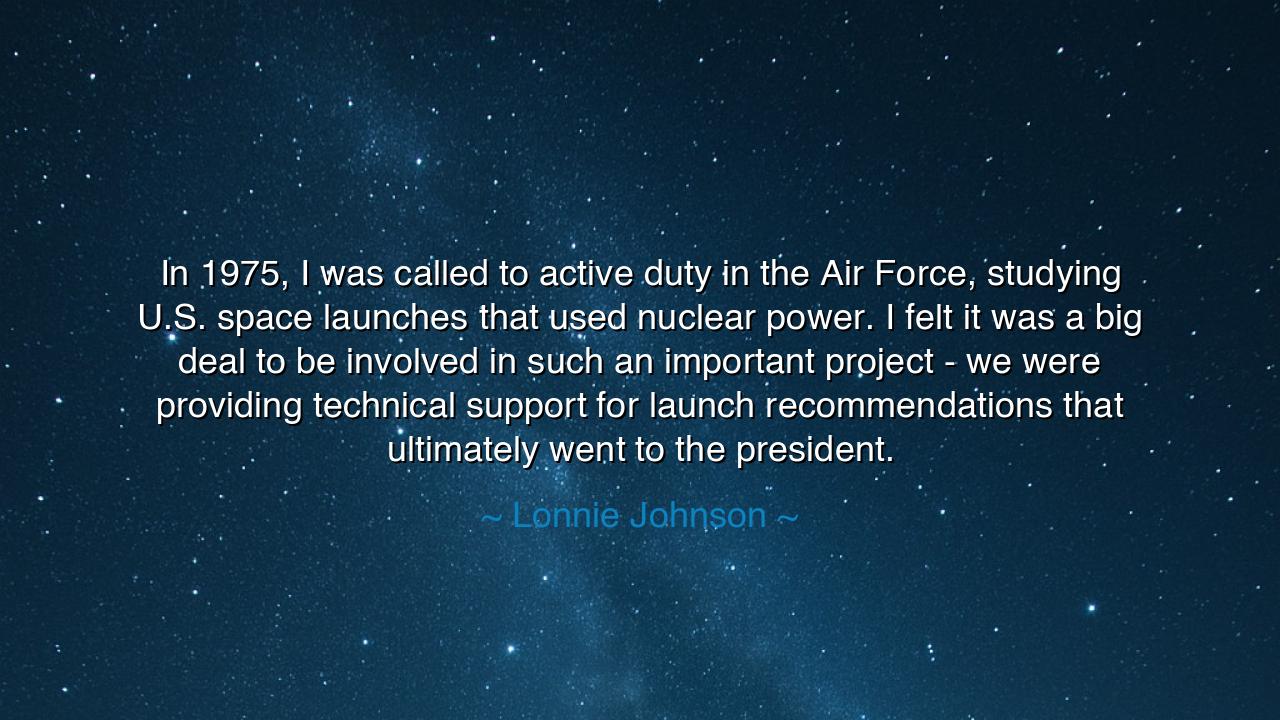
In 1975, I was called to active duty in the Air Force, studying
In 1975, I was called to active duty in the Air Force, studying U.S. space launches that used nuclear power. I felt it was a big deal to be involved in such an important project - we were providing technical support for launch recommendations that ultimately went to the president.






"In 1975, I was called to active duty in the Air Force, studying U.S. space launches that used nuclear power. I felt it was a big deal to be involved in such an important project - we were providing technical support for launch recommendations that ultimately went to the president." These words, spoken by Lonnie Johnson, carry with them the weight of responsibility and the honor of service. To be called to serve in such a critical role, in the Air Force, amidst the early days of space exploration, was to stand at the frontier of human achievement. In 1975, the world was on the cusp of extraordinary advancements—space was no longer the realm of dreamers, but of real scientists, engineers, and military experts working together to propel humanity into the stars.
What Johnson’s words reveal is the profound significance of involvement in a larger cause, a cause that transcends personal ambitions and connects the individual to the flow of history. In the ancient times, men and women who were called to serve in great endeavors were often not just serving for personal glory, but for the greater good of society. They carried with them the weight of their societies' futures, as they worked on projects that would shape the course of history. Consider, for example, the great builders of the Pyramids of Egypt—men who labored not for fame, but for the eternal vision of their Pharaohs, whose vision would mark the ages. These workers were part of a greater project, one that they understood would endure long beyond their mortal lives.
For Johnson, his involvement in the space program was not simply about technical support or scientific inquiry. It was about participating in something greater, something that would carry the hopes and dreams of an entire nation, and of the world. Space launches, particularly those using nuclear power, were not without risk, yet the sacrifice and dedication of those involved were what allowed these projects to succeed. The work Johnson and his team did helped to shape the very recommendations that would be presented to the highest offices in the land, including the president of the United States. In this way, he was a small part of a great chain of influence, where every decision, every action, rippled outward and shaped the future of humanity.
The ancient Greeks understood the importance of service to the greater good. Aristotle believed that true happiness and fulfillment came not from personal gain, but from serving the community and contributing to the common good. This same wisdom applies to Johnson’s experience. The technical support he provided was not for a fleeting purpose, but for a cause much larger than himself—one that involved the advancement of knowledge, the expansion of human boundaries, and the preservation of a nation’s safety. Each man and woman involved in such projects understood that their work would not only impact their lives but would reverberate through the ages.
Johnson's work in space was a direct reflection of this ancient wisdom. He was not merely serving in a position of personal pride; he was fulfilling a duty, one that would touch the future of space exploration and technological development. This sense of purpose, of being a part of something larger, is something that all people can learn from. Every day, we are faced with opportunities to contribute to the greater good, to leave behind a legacy that shapes the world in ways we may never see in our lifetimes. Whether it be through scientific discovery, political leadership, or small acts of kindness, the actions we take today have the power to reverberate far beyond our understanding.
Let us reflect on the importance of purpose in our own lives. Like Johnson, we too can choose to be part of something larger, something that is driven by vision and commitment. Perhaps we will not find ourselves advising the president on nuclear space launches, but we will find that our work—our efforts, no matter how small—can be the foundation for something great. The technologies we create, the decisions we make, and the influence we have on others, will ripple outward, shaping a world that is better than the one we inherited. This, too, is our calling.
The lesson here, then, is to find your cause. Do not shy away from serving something greater than yourself. Seek out opportunities to contribute to advancement, whether in science, in your community, or in the lives of those around you. Just as Johnson's work helped propel humanity into the space age, so too can your actions—no matter how small—help shape the future. Act with purpose, and know that, like those who worked before you, the work you do today has the potential to echo through the ages, creating a legacy that will inspire those who come after you.






AAdministratorAdministrator
Welcome, honored guests. Please leave a comment, we will respond soon